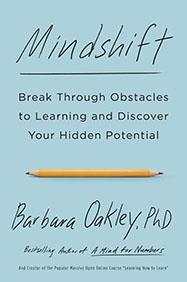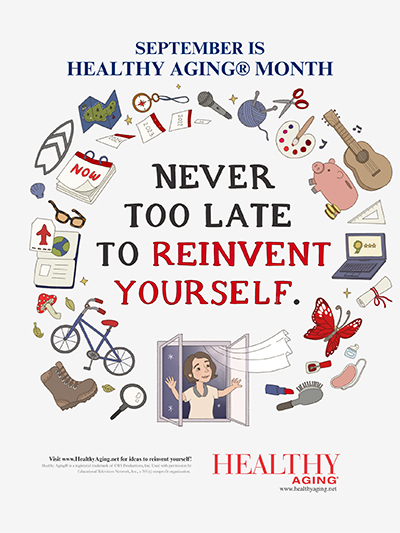 Author Barbara Oakley shares how to develop your hidden talents by taking stock of your worst traits and making them work for you.
Author Barbara Oakley shares how to develop your hidden talents by taking stock of your worst traits and making them work for you.
By Barbara Oakley, PhD
There I was, a diva in full melt down mode. I was half a mile from home, the electric audio gear slopping around in my sock and my collar microphone flopping in the wind as I stomped along. I’d just flubbed the eighth take and fled in frustration from our cramped basement “studio” into fresh air.
Frankly, I had no idea what I was doing—I’d never been videotaped before, other than typical home movies. (“Hi Mom!”) Here I was, nearly sixty years old, an introvert who liked nothing better than to sit in a corner and write. When I found myself in front of a video camera, I’d get so nervous that I’d forget how to breathe—my shaky voice squeaked like a chipmunk’s. Not only did I have no skill, but I had no talent for the new area I was trying to transition into. Hence the occasional diva meltdowns.
I could never have imagined that the videotapes we were making on the cheap in our cobwebbed basement would become the basis for the largest, most popular course in history, Learning How to Learn, now approaching two million registered students.
It turned out I had a hidden talent for making online courses. How could I have ever soldiered through all the failures to discover this hidden ability? (And trust me, this ability was really hidden!)
Developing Our Hidden Talents
We often tend to box ourselves in, thinking there are only specific areas we’re good at. In school, we tend to stick to those areas—maybe art, or language, or science. When we take career and aptitude tests, it just reinforces that feeling of “There are certain things I should stick to, because that’s what I would be best at.”
But of course, that’s just not true. As my own experience has shown, even in maturity, we’re often capable of excelling at far more than we ever give ourselves credit for.
When I was working on the book Mindshift: Break Through Obstacles to Learning and Discover Your Hidden Potential, I travelled around the world interviewing people who’ve made major transitions in their lives, doing things they thought they could never do, often involving subjects they thought they hated: musicians who became medical doctors, electrical engineers who became woodworkers, school losers and dropouts who turned around to great success.
Many of these “mindshifters” were seemingly ordinary—in fact, they were sometimes initially terrible at what they wanted to try to become. But they often had one unusual shared characteristic. They had learned to use their “worst” traits to their advantage.
Example: Feeling Like an Imposter
It’s common, when you are trying to change, for you to feel like an imposter—a not-so-good fake who’s only there by luck. Feeling like an imposter is supposedly a “bad thing.” Instead, psychologists say, you’re supposed to realize that you’re actually terrific.
But the reality is, when you’re starting something new, you often really aren’t all that good. In fact, you may indeed not be as good as everyone else. But here’s the dirty little secret: your hidden asset is that you think you’re an imposter! Precisely because you feel less equipped, you tend to be more open to what’s going on around you—to have more of a beginner’s mind. You listen more carefully, you work harder, and you don’t go off half-cocked with bossy overconfidence.
Feeling like a fake isn’t bad at all—it can be a genuine benefit!
Example: Poor Memory
Let’s take another seemingly bad trait—having a poor memory. Bummer, right?
Wrong. As it turns out, having a poor memory can be a genuine plus. Research has shown a distinct counter correlation between the strength of your working memory and your creativity. In other words, the weaker your working memory, the more creative you tend to be!
There’s more. Because of your weaker working memory, you have to find ways to simplify in you can hold something complex in mind only once you’ve found ways to simplify it—you can sometimes see elegant simplifications that smarter people can miss.
Do you sometimes have to work harder than others to grasp key ideas? Yes, but the creativity and elegant problem-solving abilities you also experience mean you’ve got something of real value. Oh yes, and you’re less likely than “smart” people to jump to wrong conclusions! Smart people, after all, aren’t used to being wrong, so they can tend to be fast, yes, but also rigid and dogmatic in their thinking. It’s not just me saying this—Nobel Prize winner Santiago Ramón y Cajal observed this in some of his more intellectually gifted colleagues.
Reframe Your Traits
As I’ve discovered through the years, perhaps the most important part of developing hidden talents is learning to reframe and see the good in your “bad” traits. These “bad” traits are often invaluable in helping you to excel long term in the talent you are trying to develop.
It’s easy to forget that learning something new is about the journey, not the destination. As for myself and my learning now, in my sixties, when I continued to work through months of learning as a video “talent,” and exploring the world of video editing, I gradually got better and better. Persistently learning, trying, and growing, even when I thought there was no way I could do it, was what ultimately counted.
How to Discover Hidden Talents?
How can you discover your own hidden talent? Look to some of your worst traits—they can give you the surprising gifts you need to move ahead.










